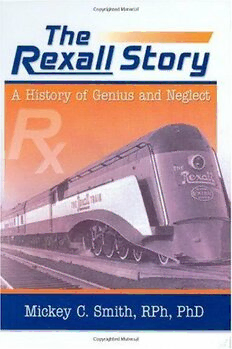
The Rexall Story: A History Of Genius And Neglect PDF
228 Pages·2004·3.282 MB·English
Most books are stored in the elastic cloud where traffic is expensive. For this reason, we have a limit on daily download.
Preview The Rexall Story: A History Of Genius And Neglect
Description:
In the second half of the twentieth century, 20 percent (10,000) of all retail druggists were Rexall druggists. Now there are none, and this book explains why! The Rexall Story: A History of Genius and Neglect shows how a brilliant and successful business/pharmacy venture was allowed to fail through carelessness and an inattention to the original formula of the company. From the celebrated genius of Louis Liggett—who started United Drug in 1903—to the business’s demise nearly 75 years later, this significant text will provide you with new insight into the pharmacy industry. With The Rexall Story, pharmacists, pharmacy and business educators, and historians alike can see how Louis Liggett single-handedly transformed the retail drug business using innovative business practices and policies. Author Mickey C. Smith, editor of the Journal of Research in Pharmaceutical Economics and principal author and editor of the seminal book Pharmaceutical Marketing: Principles, Environment and Practices, uses his expertise to explain how Louis Liggett’s techniques were so successful in the industry. This book explores in detail his communication and merchandising skills, his principles in doing business, and his revolutionary techniques for keep his business prosperous. Using internal documents, photographs, and direct quotes from radio promotions, and the recollections of former Rexall employees, this book chronicles Rexall’s story, including: the beginnings of Rexall—its origins and expansion, International Rexall Clubs, and the unparalleled efforts of Liggett and his franchisees the “Dear Pardner” letters (1903-1923)—unprecedented in “Big Business” even today, these were personal letters between Liggett and his people the Rexall “family”—conversations and correspondence with former “Rexallites,” capturing how the retirees felt about the company before and after its downfall the acquisition and marketing of the products of the Rexall Drug Company—including medicinal products, candy, water, cigars, stationery, and toiletries, among others price considerations for both the drug store owner and his customers—“store brands” and the Rexall One Cent Sale the distribution of Rexall—moving supplies, channel relationships, training courses, and conventions record-breaking promotional ideas—“Rexall Ad-Vantages” and other printed media, radio shows such as Rexall’s Parade of Stars and Rexall’s Magic Hour, The Phil Harris/Alice Faye Show, and The Rexall Train In this intriguing work of Americana, you’ll see how a pioneering drug salesman turned a dream into what was at one time the largest retail drug chain in the country. Yet this is also the story of that dream’s demise, that shows how—under the authority of Justin Dart—the original concept of Rexall unraveled until the franchises were all canceled, leaving little but a name and memories.
See more
The list of books you might like
Most books are stored in the elastic cloud where traffic is expensive. For this reason, we have a limit on daily download.
